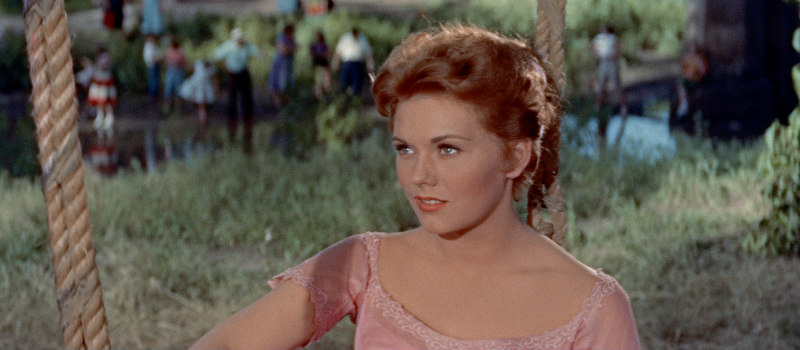
Review by Eric Hillis
Directed by: Joshua Logan
Starring: William Holden, Kim Novak, Betty Field, Susan Strasberg, Cliff Robertson, Rosalind Russell

Picnic belongs to that sub-genre of '50s Hollywood melodrama in which a free-spirited man comes to an all-American small town and quickly sets about disrupting the status quo. The finest example of this is Vincente Minnelli's superlative Some Came Running, a movie that has managed to lose none of its impact over the years despite being very much of its time. The years haven't been so kind to many other '50s melodramas, which now come off as frankly ludicrous in their over the top presentation of what might be described as white wine problems. "You're tearing me apart!" indeed.
Adapted from William Inge's Pulitzer winning play, Picnic was ridiculous from the off, thanks to one of the most infamous pieces of miscasting in Hollywood history. The protagonist of Inge's play was a twenty-something former athlete with the sort of looks women struggle to resist. No surprise then that Carter was played by Paul Newman on the stage. For the movie, somewhat inexplicably a 37-year-old William Holden (looking closer to 45 thanks to his penchant for a tipple) was cast in the role.

Picnic's drama begins with Carter hopping off a freight train and finding himself in the small Kansas town of Neewollah, where he hopes to find work courtesy of an old college buddy (Cliff Robertson). Neewollah is 'Halloween' spelled backwards, much like how the town in Troll 2 is named Nilbog. Most of the residents of Neewollah look like the type of yokels who might murder Peter Fonda in a biker movie. No wonder then that the whole town worships Kim Novak's Madge the way ancient civilisations worshipped the sun.
Madge is sick of being looked at, but Inge and screenwriter Daniel Taradash don't do her any favours with their wooden Prom Queen characterisation. Madge's cigarette smoking, Flannery O'Connor wannabe little sister Millie (a scene-stealing Susan Strasberg) is also sick of Madge being looked at. When Hal is taken in by their neighbour and ends up shirtless by way of the sort of plot contrivance a '70s sexploitation mogul would envy, both Madge and Millie look at him as though director Joshua Logan instructed both actresses to imagine it was his stage lead Newman in the role.
It happens to be Labor Day, which the residents of Neewollah take very seriously, despite it being essentially a celebration of socialism and this being small town America in the midst of the Red Scare. A massive fare - shot in a way that makes you wonder if Spielberg was influenced by this movie for his beach montages in Jaws - attracts everyone to the centre of town, awaiting the evening's centrepiece, when Madge is crowned Queen of Neewollah in a ceremony of the sort you might find on some undiscovered Polynesian island. The drink flows and Carter's presence turns every female around him into a desperate nympho, leading to much melodrama with a capital M.

Holden's casting renders much of Picnic unintentionally laughable. Characters played by actors who are barely older than Holden frequently refer to him as 'boy', and he looks positively uncomfortable parading around bare-chested. In the movie's most over-the-top scene, Holden's Carter is ravaged by a desperate spinster played by Rosalind Russell (much closer in age to Holden than Novak), who rants about how his body reminds her of statues of Greek Gods while tearing the shirt off his back. Most gobsmacking of all is how nobody bats an eyelid at this middle-aged man taking teenager Millie (a 17-year-old Strasberg looking considerably younger) to the fare as his 'date'; rather some see them as making a cute couple!
If Picnic has stuck around in the cinematic consciousness while better examples of its genre have faded away, it's no doubt down to its unintentional campness. Director Logan had adapted Inge's play on the stage, but he struggles to transfer his skills to the screen, unsure of how to fill the ultra-wide CinemaScope frame. Witness a scene that plays out with a bunch of gormless extras standing in the background staring at the camera with vacant expressions that suggest they've been body-snatched.
Luckily for Logan, he's working with one of Hollywood's greatest ever cinematographers, the legendary James Wong Howe, proving as adept in the field of Technicolor as the black and white photography he's more commonly associated with. The magic hour shots of the titular celebration winding down wouldn't look out of place in a Terrence Malick film.

George Duning's score is suitably exaggerated, preposterously turning a minor disagreement between Madge and her mother into a major catastrophe, but elsewhere jazz standards are employed deftly to add a touch of refined class to an otherwise insane motion picture.
Picnic is best viewed with a forgiving eye and an understanding of the machinations of '50s Hollywood and how out of step the dying studio system could be with developments in the world outside that small patch of Californian land. But it also offers some of what the studio system did best, thanks largely to Howe's ability to turn a nondescript small town into a colourful fantasy world, fitting for the bloated excess of Logan, Inge and Taradash's very silly but undeniably entertaining melodrama.

Extras:
Choice between original stereo audio or a new 5.1 track which really lets the melodramatic score swell; an archival interview with Novak; original trailer; and a booklet featuring writing by Travis Crawford.

Picnic is on blu-ray now from Eureka Classics.
